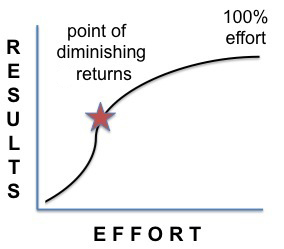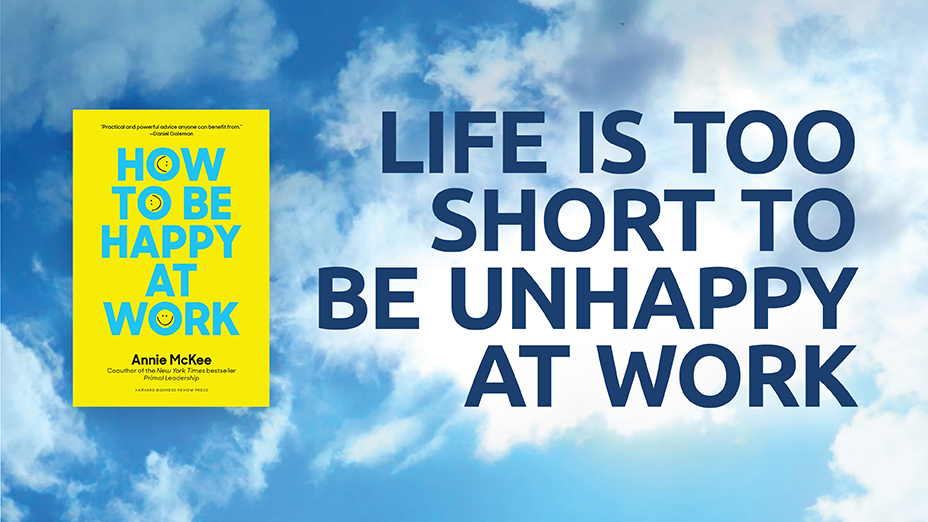There is nothing wrong with hard work. But what if there is a way of extracting the greatest amount of value with the least amount of effort, thus freeing you up to do other more valuable things?
As an entrepreneur, there are an unlimited number of things you could do in order to grow or improve your business. I could easily keep myself busy 100 hours per week, and have done so countless times throughout my career.
Each morning I ask myself, what is the one thing I need to do today?
Unfortunately, we often convince ourselves that we MUST work those kinds of hours in order to be successful.
The reality is that there is a point of diminishing returns. Although more work might produce more results, the return on the additional effort decreases significantly.
Regardless, we keep plugging along because we are programmed to do so. I personally feel like I’m slacking off if I’m not on my computer, on the phone making calls, or meeting with people.
For some individuals, they wouldn’t know what to do with their time if their profession did not keep them occupied. There are others who become workaholics in order to avoid dealing with difficult issues in their life.
So we keep on working.
But what if you were only allowed to work one hour a day? What would you do?
I am sure you are thinking that this is easier said than done.
Well of course everything is easier said than done! Regardless, we look for excuses as to why we can’t do something. We blame our parents. We blame our circumstances. We blame the government. We blame our family. We blame our employer or boss. We look for reasons to avoid trying something new; something that might radically change your business and your life.
Therefore, instead of finding reasons why something won’t work, get creative about how to make it work. Ask yourself, “How can I apply the underlying principles to my specific situation?” Even if you can’t apply the concept in its entirety, look for the nuggets that you can use.
Here are some ideas to get you started:
Focus on What’s Most Important
Each morning I ask myself, what is the one thing I need to do today? What is the one thing that will create the most value? Once I determine this critical task, I engage in that activity for the day. Everything else is eliminated, delegated or deferred.
Instead of keeping myself busy and climbing to the top of the “S” curve (see picture), I stop at the inflection point; the point of diminishing returns (the star). Pareto would say that 20% of the effort provides 80% of the results. Whether it is 20% or 40% is not important. The key is to find the point where more effort starts producing fewer results, and only you can decide that.

Will you achieve 100% of the potential value? Probably not. But is squeezing out an extra 20% of value really worth 4 or 5 times the effort?
The key is to focus on activities that will create leverage and will maximize results.
Create a New S Curve
What will you do with your free time?
You could take a vacation, spend time with family, or volunteer and give back to society.
Or, you could create a new S-curve.
Instead of squeezing out those few extra drops from your current business model where there are diminishing returns, start building a new business or business model that leverages your past success yet creates entirely new revenue opportunities.
With the freed up time, I’ve been working on a new book that targets a completely different market for me. This will take upfront effort. But when it is done, and I have built up momentum, I will spend less time on that business model, freeing me to create a new set of revenue streams.
To be clear, I am not suggesting you do a half-assed job. Doing so will kill your business in the long run.
And this strategy works best for a business that has momentum; where you are already successful. Once you are successful, you can then reap the rewards. You can implement processes that others can execute. You can delegate, automate, or eliminate the things that are not critical.
Ditch your Worst Customers
Look at your customers. Instead of trying to get more customers, ask, “Which customers should I eliminate?” Admit it, there are customers that generate less income than others, yet take up most of your time.
The solution? Ditch the 20% that are sucking up your time but not producing commensurate returns. This not only frees up some hours in your day, it frees up your mental energy. I realize that when money is tight, this can seem like a risky proposition. And, it is! But you intuitively know that attempting to keep 100% of your customers happy 100% of the time will keep you working 100 hours a week, limiting your true growth potential.
Ditch Your Lowest Return Activities
Look at the work you do. Look at your to do list. You will never get 100% of the work done, even if you had 200 hours in a week. Regardless, we still strive to get 100% done. Again, this mentality limits your growth potential.
Instead of asking, “How can I get as much done as possible?” ask, “What should I stop doing?” or “What are the things I must do?” Or better yet, ask, “What is the one thing that will unlock the greatest growth potential for my business? What gives me leverage?” Be honest. What would happen if you got one less thing done off your to do list? Two less things? Find the sweet spot of where you can get the optimal return. Then delegate, automate, or eliminate the rest. While it may feel like it, you are not the only one who can do most of your activities. And believing that will kill you.
Ditch Your Stuff
What is the one thing that will create the most value?
Back in 1999, I made a conscious decision to downsize my life; and I did so to a great extent. In fact, I was able to get everything that I owned into two boxes – literally. In doing so, what I had discovered was that there is a freedom, a liberation that comes from not having “stuff” and from being able to live the simplest life possible. When there is less clutter around you, there are fewer things to worry about. And because you’re spending less money, you don’t have to concern yourself with making as much money. It gives you freedom.
Therefore, instead of accumulating, what you need to do is start appreciating.
Take a hard look at what you have and where you’re spending your money. Ask yourself, “What do I really, truly need?” What can I get rid of? Then begin the process of donating, recycling or disposing of the excess. If you free up your space, you will undoubtedly free up your mind.
Freeing up your time by focusing on what’s important will produce great dividends in the end. If you only spent 20% of your time extracting 80% of the value from your business, this gives you 80% of your time to do something different – something more fulfilling, something more enjoyable, or something that can provide even greater long-term value. Freedom is the name of the game. Don’t let perfection be the enemy of a good life and a successful business.




.png)




What Did You Think?